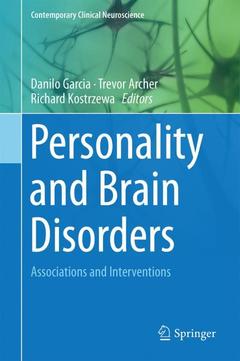Personality and Brain Disorders, 1st ed. 2019 Associations and Interventions Contemporary Clinical Neuroscience Series
Coordonnateurs : Garcia Danilo, Archer Trevor, Kostrzewa Richard M.

Brain disorders (neurodevelopmental, neurodegenerative, and affective disorders) can be investigated, treated, and prevented using person-centered methods. Because researchers have not reached a clear consensus on whether or not personality is stable or changeable, it has been difficult to outline how to use these methods in the care of people with brain disorders. Thus, the first part aims to identify the ways in which brain disorders and personality are linked. The second part explores different person-centered approaches that can be incorporated in a healthcare or education setting to help people with various brain disorders and to promote physical, mental and social health. The third part focuses on challenges and new venues.
Danilo Garcia, Phd (in psychology in 2012), is Head of Research of the Blekinge Centre of Competence at the Blekinge County Council. The Center works on research, development, innovations through interdisciplinary teams, person-centered methods, community projects, and the dissemination of knowledge in order to increase well-being among the habitants of the county of Blekinge, Sweden. He is also an Associate Professor at the University of Gothenburg and together with Professor Trevor Archer and Associate Professor Max Rapp Ricciardi, the leading researcher of the Network for Empowerment and Well-Being. This is an international network of junior and senior researchers and students who are interested in the field of well-being research.
Aimed at researchers, graduate students, and practitioners in fields from medicine to the social sciences
Outlines the connections between personality and various brain disorders
Presents some applications that can be used in the context of health care and education
Date de parution : 05-2019
Ouvrage de 297 p.
15.5x23.5 cm



